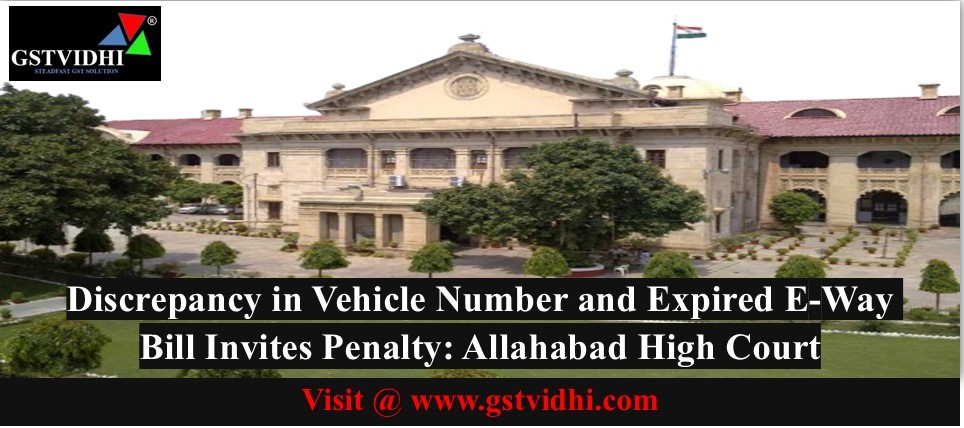
Discrepancy in Vehicle Number and Expired E-Way Bill Invites
Penalty: Allahabad High Court Rejects Relief to Lalitpur Power Generation
Introduction
The Allahabad High Court
continues to reinforce the importance of strict e-way bill compliance under the
GST regime. In a recent decision in M/s Lalitpur Power Generation Company
Ltd. vs State of U.P., the Court dismissed the petition challenging a
penalty order under Section 129(3) of the UPGST Act, imposed due to expired
e-way bill and mismatch of vehicle number in Part B of the e-way
bill.
This case serves as a
strong reminder that technical lapses in e-way bill details, post-April 2018,
are presumed to be indicators of intent to evade tax, unless
convincingly rebutted.
Case
Summary
- Case Title:
M/s Lalitpur Power Generation Company Ltd. vs State of U.P. and Others
- Court:
High Court of Judicature at Allahabad
- Bench:
Hon’ble Mr. Justice Rohit Ranjan Agarwal
- Case Number:
Writ Tax No. 595 of 2023
- Neutral Citation No.:
2025:AHC:55245
- Order Date:
15 April 2025
Facts of
the Case
The petitioner, M/s
Lalitpur Power Generation Company Ltd., operates a thermal power plant at
Mirchwara and Burogaon, District Lalitpur. It is a registered GST dealer.
Transportation and
Interception
- On 19 January 2023, goods were
transported from the Jhansi godown to the power plant.
- The goods were carried in Vehicle
No. UP94 AT/1712, and intercepted at 3:22 PM on Lalitpur Road,
Jhansi.
- Upon inspection, the department
found:
- Two invoices,
- Two bilties,
- Two e-way bills.
Discrepancy Noticed
1. Vehicle
Mismatch:
o Vehicle
number declared in Part B of e-way bill No. 771311092438 did not
match the vehicle in transit.
2. Expired
E-Way Bill:
o E-way
bill No. 431305638265 had expired on 15 January 2023, yet was
used for transport on 19 January 2023.
The goods were detained
under Section 129(1) of the UPGST Act, and a show cause notice
was issued. The reply was found unsatisfactory, and a penalty of ₹93,298
was imposed on 20.01.2023, which was later upheld by the appellate
authority on 17.04.2023.
Petitioner’s
Submissions
Through its counsel, the
petitioner made the following arguments:
1. No
Intent to Evade Tax:
o All
documents — invoices, bilties, and e-way bills — were furnished.
o The
discrepancies were minor and clerical, not deliberate.
2. Technical
Lapse:
o The
mismatch in vehicle number and expiry of e-way bill were technical errors,
not grounds for presuming tax evasion.
3. Appellate
Order is Non-Speaking:
o The
appellate authority allegedly did not apply its mind, and passed a mechanical,
non-reasoned order.
4. Precedents
Cited:
o Petitioner
relied on multiple older decisions such as:
§ M/s
Varun Beverages Ltd. vs State of U.P.
§ M/s
Century Rayon vs Union of India
§ M/s
Singh Tyres vs State of U.P.
o These
judgments granted relief in similar cases of document mismatch or expired e-way
bills.
Respondent’s
Submissions
The State argued that:
1. Violation
of Rule 138A and Section 68:
o The
goods were transported without valid e-way bill, in breach of mandatory
provisions.
2. Presumption
of Tax Evasion Applies:
o In
line with post-April 2018 amendments, discrepancy in e-way bill or
expired e-way bill creates a presumption of evasion, unless clearly
rebutted.
3. Case
Law Supports Penalty:
o Relied
on recent judgments:
§ M/s
Akhilesh Traders vs State of U.P. (20.02.2024)
§ M/s
Jhansi Enterprises vs State of U.P. (01.03.2024)
o These
held that post-interception production of documents cannot absolve liability,
especially where e-way bill is invalid or expired.
Key Legal
Issues Considered
1. Whether
minor discrepancies in e-way bill details can justify a penalty under
Section 129(3)?
2. Can
expired e-way bills or mismatch of vehicle number be excused as clerical error?
3. Does
the law allow presumption of intent to evade tax in such cases?
Court’s
Observations
Hon’ble Justice Rohit
Ranjan Agarwal held:
1. Valid E-Way Bill is
Mandatory Post-April 2018
- After the 14th Amendment of UPGST
Rules, 2017 (w.e.f. 01.04.2018), the requirement of valid e-way
bill is mandatory.
- Rule 138 clearly mandates that
movement of goods must be supported by:
- Proper invoice,
- Part A and B of e-way bill,
- Valid vehicle details.
2. Presumption of Tax
Evasion is Justified
The Court cited Akhilesh
Traders:
“If the goods are not
accompanied by the invoice or e-way bill, a presumption may be raised
that there is intent to evade tax. Such presumption is rebuttable, but
requires solid explanation.”
In this case, no
satisfactory rebuttal was provided.
3. Post-Interception
Compliance Not Enough
- Furnishing documents after
interception cannot absolve liability under Section 129.
- If interception hadn’t occurred,
the State would have lost revenue.
4. Prior Judgments Not
Applicable
- Cases cited by the petitioner relate
to transactions before April 2018, when technical difficulties in
e-way bill generation existed.
- Those judgments don’t apply
post-implementation of the 14th amendment.
Final
Judgment
The Hon’ble High Court
concluded:
- The transportation violated Rule
138 and Section 68 of the UPGST Act.
- The petitioner failed to rebut the
presumption of evasion.
- No case for interference
under Article 226 is made out.
Result:
· Writ
Petition Dismissed
· Penalty of ₹93,298 Upheld
· No
Relief Granted
Conclusion:
GST Compliance Is Non-Negotiable
This decision underscores
that minor discrepancies like mismatched vehicle numbers or expired
e-way bills can lead to significant penalties under GST.
Importantly, the Court
has clarified that:
- Presumption of evasion
applies in cases of invalid e-way bills,
- Post-April 2018,
there is no excuse for technical errors, and
Real-time compliance is essential to
avoid penal consequences
Disclaimer: All the Information is based on the notification, circular and order issued by the Govt. authority and judgement delivered by the court or the authority information is strictly for educational purposes and on the basis of our best understanding of laws & not binding on anyone.
Find the Attachment (Press on Click Here )
Click here